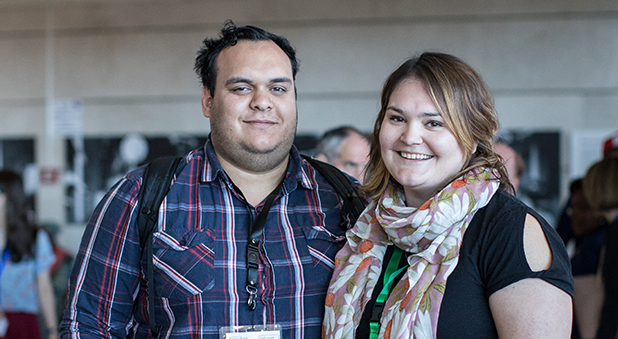Chase Kuhn recently sat with Nathaniel “Jum” Naden to ask him some questions about his experience as an Aboriginal Christian man and gain his wisdom about how non-Aboriginal and Aboriginal Christians might progress in gospel fellowship together. (At Jum’s request, people should note that this discussion is quite complex and, though Jum is a developing Aboriginal Christian leader, he does not speak for all Aboriginal people everywhere. His answers are reflective of his experience and thoughts on the issue as they relate to the gospel.)
We tend to think from our own experience outward, which means we can assume others are just like us. How would you encourage someone to understand your culture and what it is like to see through your eyes?
Stereotypes are significant. People often assume much about Aboriginal people immediately, such as: uneducated, don’t care for themselves, bludgers, druggies, alcoholics, etc. It is not that these descriptions aren’t accurate of some Aboriginal people (just as they are of non-Aboriginal people!), but they are unfair assumptions. In churches, if I walk into a non-Aboriginal congregation, people generally assume these stereotypes. If they are generous, they might only assume that I am likely not a Christian, or if I am then I am likely a charismatic or a mystic.
It is also important to know that we have a great awareness of human mortality. Death is something that is common for us. But, because of many problems, it is rare to see death at a “natural” time or in a “natural” way among our people.
How can we show respect to Aboriginal people, especially our Christian brothers and sisters?
Listen to them. Show them that you sincerely care, and do this by getting beyond the superficial. Don’t approach them in a way that just “shows respect to the black man”, but honour them as a fellow human being, and in Christian community as a brother/sister in Christ. After you have established a relationship, it is a very good thing to ask someone to tell you their story. But relationships are crucial. Some people, especially those of the stolen generation, have difficult stories to tell. So, their stories must be told within the confines of trusting relationships.
Are prayers honouring custodianship of the land helpful or hurtful?
In principle they aren’t bad, but they can often seem tokenistic because they aren’t backed by a broader conversation showing real care and respect.
Why do you think the conversation isn’t happening? As a foreigner to Australia, I suspect the apathy is due to fear of inability to reach an agreement.
I am sure there is some fear about what would be the “right” outcome from the conversation, but what is important is to have the conversation. We don’t talk about it.
As an example, it is very important for non-indigenous Australians to recognise that land is crucial to Aboriginal identity. Being removed from our land has had significant consequences for our sense of who we are. As for fear, at the end of the day it is okay for us to be different and to disagree. We just want to be cared for by being heard. At the moment, we aren’t having the conversation.
As we begin the conversation, black people will need to let go of some things. But white people (and other colours) will need to think about changing some things, too – perhaps even just their attitudes. As we converse as Christians, we will need to think through what it means to be one “new man” in Christ.
What would be a good forum for these conversations?
Church leaders can model this, and they can do so by seeking out elders in nearby communities.
How can we think about mission among Aboriginal people today, especially in view of a difficult history?
Building relationships is crucial and much more effective than drop-in, short-term initiatives. You need to get to know the people you want to reach and show them you genuinely care about them as human beings. It is also good to talk with Aboriginal leaders and ask them ways that you might effectively serve with them.
Historically, the problem has been paternalism; that is, people have not allowed ministry to suit the cultural context that they are serving in, but have demanded that Aboriginals join their culture. This has, of course, had roots in very poor and misguided understandings of the true humanity of Aboriginals. As people have repented of this, the pendulum has swung too far in the other direction, leaving white churches to simply send money (at best) but have no genuine partnership.
What we need is true gospel partnership; one that is grounded in a common love for Christ and an appreciation for our common identity in him. So, when we do mission, we must work together, in real and sincere partnerships.
You are moving into a ministry position next year, and are pursuing a role as an Anglican minister. Why are you doing this?
Theologically I affirm Anglican doctrine. With this, my theology convicts me that the Anglican Church needs Aboriginal people in it. This does not mean that we become acultural, but the gospel is the uniting principle in our fellowship.
In terms of mission, the church needs black and white people to work together. So, I am working cross-culturally, in one sense, in order to see people reached for Christ. I want to do my part in giving expression to true gospel partnership.
The Aboriginal church needs the white church. We don’t have the resources to be able to carry out gospel ministry like others do.
We have a lot of work to do in seeing the gospel bridge the racial divide in our country. I want to help show forth healthy mission that is truly gospel driven. I think this starts in the local church.
Being a part of the Anglican Church gives me access, resources and accountability for gospel mission.






















